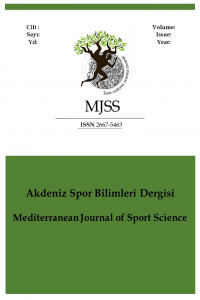Yapabilirim Ama Yapmıyorum! Antrenörlerin Sportmenlik İkilemi
Ahlaki ikilem, Öz-yeterlik, Sportmenlik, Futbol antrenörleri
I Can, But I Don't! Coaches' Sportsmanship Dilemma
Moral dilemma, Self-efficacy, Sportsmanship, Football coaches,
___
- Aktaş, İ., & Sezen-Balçıkanlı, G. (2023). Antrenörlerin sportmenlik öz-yeterliği: Ölçek geliştirme çalışması. Gazi Beden Eğitimi ve Spor Bilimleri Dergisi, 28(2), 78-91.
- Bandura, A. (1977a). Self-efficacy: toward a unifying theory of behavioral change. Psychological Review, 84(2), 191-215.
- Bandura, A. (1991). Social cognitive theory of moral thought and action. In W. M. Kurtines & J. L. Gewirtz (Eds.), Handbook of moral behavior and development (pp. 45-103). Hillsdale, NJ: Erlbaum.
- Bandura, A. (1997). Self-efficacy: The exercise of control. New York: Freeman.
- Bandura, A. (2006). Guide for constructing self-efficacy scales. In F. Pajares, & T. Urdan (Eds.), Self-efficacy beliefs of adolescents (pp. 307-337). Greenwich, Connecticut: Information Age.
- Bandura, A., (1977b). Social learning theory. Englewood Cliffs, NJ: Prentice Hall.
- Boardley, I. D. (2018). Coaching efficacy research: learning from the past and looking to the future. International Review of Sport and Exercise Psychology, 11(1), 214-237.
- Boardley, I. D., & Kavussanu, M. (2007). Development and validation of the moral disengagement in sport scale. Journal of Sport and Exercise Psychology, 29(5), 608-628.
- Bolter, N. D., Kipp, L., & Johnson, T. (2018). Teaching sportsmanship in physical education and youth sport: Comparing perceptions of teachers with students and coaches with athletes. Journal of Teaching in Physical Education, 37(2), 209-217.
- Ciairano, S., Gemelli, F., Molinengo, G., & Musella, G. (2007). Sport, stress, self-efficacy and aggression towards peers: unravelling the role of the coach. Cognition, Brain, Behavior, 11(1), 175-194.
- Clifford, C., & Feezell, R. M. (2010). Sport and character: Reclaiming the principles of sportsmanship. Champaign: Human Kinetics
- Constandt, B., De Waegeneer, E., & Willem, A. (2019). Ethical code effectiveness in football clubs: A longitudinal analysis. Journal of Business Ethics, 156, 621-634.
- Durkheim, E. (2014). The rules of sociological method (W. D. Halls, Trans.) New York: The Free Press.
- Feltz, D. L., & Lirgg, C. D. (2001). Self-efficacy beliefs of athletes, teams and coaches. In R.N. Singer, H.A. Hausenblas, & C.M. Janelle (Eds.), Handbook of Sport Psychology (pp. 340-361). New York: John Wiley & Sons, Inc.
- George, D., & Mallery, P. (2016). IBM SPSS statistics 23 step by step: A simple guide and reference New York: Routledge.
- Hamilton, M. G., & LaVoi, N. M. (2017). Ethical professional identity and the development of moral exemplar collegiate coaches. Journal of Moral Education, 46(2), 114-128.
- Hamilton, M. G., & LaVoi, N. M. (2020). Coaches who care: Moral exemplars in collegiate athletics. Journal of Applied Sport Psychology, 32(1), 81-103.
- Hardman, A., Jones, C., & Jones, R. (2010). Sports coaching, virtue ethics and emulation. Physical Education and Sport Pedagogy, 15(4), 345-359.
- Higham, A. J., Newman, J. A., Stone, J. A., & Rumbold, J. L. (2021). Coaches’ experiences of morality in English professional football environments: Recommendations for creating a moral atmosphere. International Sport Coaching Journal, 9(2), 211-221.
- Jackson, B., & Beauchamp, M. R. (2010). Self-efficacy as a metaperception within coach–athlete and athlete–athlete relationships. Psychology of Sport and Exercise, 11(3), 188-196.
- Kavussanu, M. (2008). Moral behaviour in sport: A critical review of the literature. International Review of Sport and Exercise Psychology, 1(2), 124-138.
- Kavussanu, M., & Boardley, I. D. (2009). The prosocial and antisocial behavior in sport scale. Journal of Sport and Exercise Psychology, 31(1), 97-117.
- Kavussanu, M., Seal, A. R., & Phillips, D. R. (2006). Observed prosocial and antisocial behaviors in male soccer teams: Age differences across adolescence and the role of motivational variables. Journal of Applied Sport Psychology, 18(4), 326-344.
- Lirgg, C. D., Dibrezzo, R., & Smith, A. N. (1994). Influence of gender of coach on perceptions of basketball and coaching self-efficacy and aspirations of high school female basketball players. Women in Sport and Physical Activity Journal, 3(1), 1-14.
- Naylor, A. H. (2007). The coach's dilemma: balancing playing to win and player development. Journal of Education, 187(1), 31-48.
- Rawls, J. (2005). A theory of justice. Cambridge, MA: Harvard University.
- Romand, P., & Pantaléon, N. (2007). A qualitative study of rugby coaches’ opinions about the display of moral character. The Sport Psychologist, 21(1), 58-77.
- Rubin, D. B. (1976). Inference and missing data. Biometrika, 63(3), 581-592.
- Sezen-Balçıkanlı, G. (2009). Fair play and empathy: A research study with student teachers. Journal of US-China Public Administration, 6(4), 79-84.
- Sezen-Balçıkanlı, G. (2014). Fair play in professional sports: Sportspersonship orientations of futsal players. FairPlay, Revista de Filosofia, Ética y Derecho del Deporte, 2(1), 33-49.
- Spruit, A., Van Vugt, E., Van Der Put, C., Van Der Stouwe, T., & Stams, G. J. (2016). Sports participation and juvenile delinquency: A meta-analytic review. Journal of Youth and Adolescence, 45(4), 655-671.
- van der Bijl J. J., & Shortridge-Baggett L. M. (2001). The theory and measurement of the self-efficacy construct. Scholarly Inquiry for Nursing Practice. 15(3), 189-207.
- Vidoni, C., & Ulman, J. D. (2012). The fair play game: Promoting social skills in physical education. Strategies, 25(3), 26-30.
- Yayın Aralığı: Yılda 4 Sayı
- Başlangıç: 2018
- Yayıncı: Hasan ŞAHAN
Spor Organizasyonlarında Beklenti Ölçeği Geçerlik ve Güvenirlik Çalışması
Harun AYAR, Kubilay ÇİMEN, Aydın PEKEL
Serkan Necati METİN, Yağmur AKKOYUNLU
Spor Bilimleri Fakültesi Öğrencilerinin Duygusal Zekâ Düzeylerinin Belirlenmesi
Mustafa Barış SOMOĞLU, Samet ZENGİN
Hasan Hüseyin YILMAZ, Kemalettin SEREN, Gökhan ATASEVER
Vücut Geliştirme Sporcularında Bigoreksiya ve Özgüven İlişkisi
Kar Sporlarında İzokinetik Diz Kuvvetlerinin Karşılaştırılması
Buket SEVİNDİK AKTAŞ, Kemalettin SEREN, Fatih KİYİCİ, Gökhan ATASEVER, Serhat AKTAŞ
Profesyonel ve Amatör Güreşçilerin Spor Yaralanması Kaygı Düzeylerinin İncelenmesi
Yasemin ADAR YİĞİT, İsa SAĞIROĞLU, Fuat ERDUĞAN, Ajlan SAÇ
Gençlik ve Spor İl Müdürlüğü Personelinin Örgütsel Bağlılıklarının İş Doyumuna Etkisi
Doğukan Batur Alp GÜLŞEN, Yeşim BAYRAKDAROĞLU, Yavuz ÖNTÜRK, Mustafa AYHAN, Mahir KAPLAN
